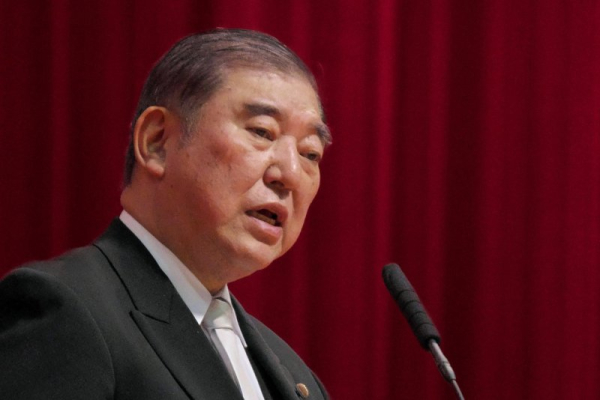

Japan ‘s Prime Minister Shigeru Ishiba delivers a speech during the graduation ceremony for Japan’s National Defense Academy in Yokosuka, Kanagawa-prefecture, Japan on Saturday, March 22, 2025. File Photo by Keizo Mori/UPI | License Photo
Japan’s Prime Minister Shigeru Ishiba, who assumed office in October 2024, could face mounting political pressure as his ruling coalition is projected to lose its majority during elections for the House of Councilors on Sunday.
Ishiba acknowledged Sunday night to public broadcaster NHK that it would be difficult for the ruling coalition, an alliance of his Liberal Democratic Party and the Komeito Party, to secure the 50 seats in the House of Councilors election to maintain a majority.
Before the election, the LDP-Komeito coalition together held 66 of 125 seats up for grabs this cycle, but exit polls conducted by NHK with other national news outlets showed they are expected to only win somewhere between 32 and 51 seats in the upper house.
“The situation is severe, and we must accept it humbly and sincerely,” Ishiba said in remarks to NHK. He added that his party has a “responsibility” to fulfill the promises it made to voters, including raising wages more than inflation and measures to combat population decline.
The country’s national legislature, called the Diet, is comprised of two houses: the House of Councilors, and the more powerful lower house, called the House of Representatives, which is responsible for selecting the prime minister.
Ishiba became Japan’s prime minister last fall after winning the ruling LDP’s internal leadership election, replacing Fumio Kishida, who stepped down amid declining approval and scandal ties.
Because the LDP held a majority in the lower house of parliament at the time, through its longstanding coalition with the Komeito party, Ishiba’s victory secured his elevation to the country’s top office.
Days after taking power, he called a snap general election in October 2024 in an effort to strengthen his mandate. Instead, voters handed his party a historic defeat: the LDP-Komeito coalition lost its majority in the lower chamber for the first time in over a decade, forcing Ishiba to lead a fragile minority government.
Now, Ishiba’s leadership is facing another major test in Sunday’s upper house election, where exit polls suggest the ruling coalition is also on track to lose control of the legislature’s second chamber, which would make it difficult for the government to pass legislation.
Under Japanese law, a minority government can continue to rule as long as it avoids a no-confidence vote in the House of Representatives and because Japan’s opposition is often fragmented, it could be hard to oust a weakened ruling party. Still, it could lead to the possibility that Ishiba may choose to resign less than a year after becoming prime minister.
Masataka Furuya, chairman of the Central Election Management Committee, released a statement before voting Sunday, encouraging the public to participate in the voting process. As of 7:30 p.m. local time, the nationwide voter turnout rote for the election was 29.9%, lower than the previous election three years ago.
The back-to-back losses reflect growing voter dissatisfaction with the LDP under Ishiba, driven by economic stagnation, public frustration over immigration policy, and fatigue with the party’s decades-long grip on power.
“We hope that all voters will fully understand the significance of this regular election of the House of Councilors, actively participate in the voting, and exercise their precious vote with care,” the office of the Minister of Internal Affairs and Communications said in a statement Sunday.
“We also ask that those involved in the voting and counting of the elections take strict and fair action and take the utmost care in managing and executing the elections.”